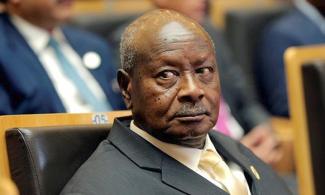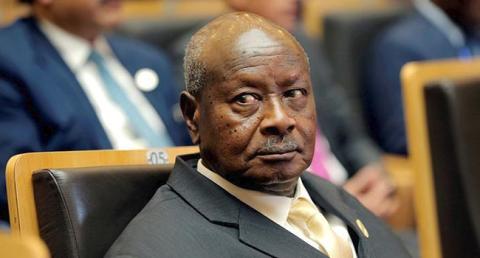
The gradual easing of Internet curbs came as police announced dozens of arrests for alleged election-related violence, and surrounded the headquarters of the main opposition party whose leader is under effective house arrest.
Internet was partially restored in Uganda on Monday almost five days after a near-total blackout was imposed across the country ahead of elections the opposition says were rigged.
The gradual easing of Internet curbs came as police announced dozens of arrests for alleged election-related violence, and surrounded the headquarters of the main opposition party whose leader is under effective house arrest.

Long-term leader Yoweri Museveni was declared the winner of a January 14 presidential election marred by allegations of massive rigging and intimidation of opposition members, securing 58.6 percent of the vote and a sixth term after 35 years in power.
His main rival, musician-turned-lawmaker Robert Kyagulanyi, popularly known as Bobi Wine, came a distant second with 34.8 percent. He has rejected the results, and decried the election as a sham.
A government spokesman said an unprecedented internet shutdown imposed on January 13 for alleged national security reasons had been lifted.
“The Internet has been restored. Other platforms are still under review,” Ofwono Opondo, the spokesman, told AFP.
“We shall go full throttle depending on what happens in the initial phase of opening connectivity… We advise Internet users, especially those from the opposition, not to use it to promote hate messages, threats and intimidation.”
Social media access remained patchy in the capital, Kampala, where millions of Internet users have been unable to send emails, search the web, or use Facebook, WhatsApp and other communication platforms for the better part of a week.
NetBlocks, a non-governmental organisation that tracks Internet shutdowns, said network data showed a rise in connectivity in Uganda to 37 percent after all but core infrastructure, regulatory and government networks were switched off.
“This suggests that Uganda’s election shutdown, or at least the procedure under which it was implemented, was planned some time in advance. This has been one of the more orderly nation-scale network blackouts we’ve tracked,” NetBlocks told AFP.
The headquarters of Wine’s National Unity Platform (NUP) in Kampala was under police guard Monday in what the opposition leader called a “raid” by security forces.
“Museveni after committing the most vile election fraud in history, has resorted to the most despicable forms of intimidation,” Wine tweeted.
Uganda police spokesman, Fred Enanga, said 55 people had been arrested over the election period for “violent acts” including blocking highways and damaging property.
“Though the polls were peaceful and a success, there were criminal elements that wanted to cause violence,” he said, adding the accused would face court.
The runup to polling day was marred by bloodshed and a sustained crackdown on government critics and Museveni’s rivals.
At least 54 people were shot dead in November over two days of street protests over Wine’s arrest, and the opposition leader was repeatedly detained and his rallies broken up with tear gas and live rounds.
The United States said it was “deeply troubled” by reports of violence and irregularities in Thursday’s poll, though Museveni declared it the cleanest in Uganda’s post-independence history.
Wine was the frontrunner of the opposition candidates running against the veteran leader, who has ruled uninterrupted since taking power as a rebel leader in 1986.
Once hailed for his commitment to good governance, the former rebel leader has crushed any opposition and tweaked the constitution to allow himself to run again and again.
Wine on Sunday said the military had taken over his house in the previous four days, placing him and his wife under house arrest.
In his first tweet since Friday, Wine noted that they had run out of food supply and that his wife was assaulted by the military as she went outside to pick vegetables at the garden.
“It’s now four days since the military surrounded our home and placed my wife and I under house arrest. We have run out of food supplies and when my wife tried to pick food from the garden yesterday, she was blocked and assaulted by the soldiers staged in our compound. (ADMIN),” he tweeted.
On January 14, both Bobi Wine and his wife had their phones blocked and could not receive or make any calls.
“Like my wife’s, my phone has been blocked and I am unable to receive or make regular calls. I know this is to stop me from communicating to our agents and coordinators. I encourage you comrades to be vigilant as I try to devise ways of reaching out to you,” said the opposition leader.
Ugandan security officials had earlier said they were protecting Wine after Thursday's election.
Reports say dozens of people were killed during violence in the run-up to the election.
Ahead of Election Day, the government shut down Internet connections in the country, drawing condemnation from civil society and election observers.